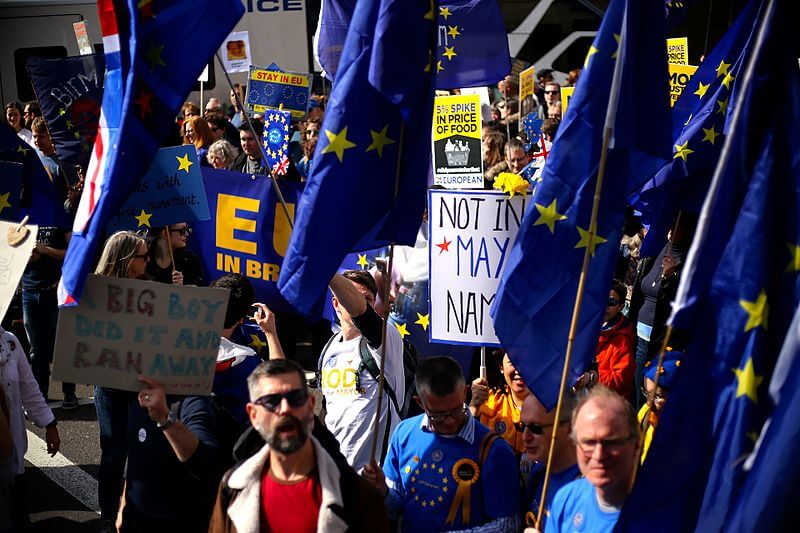*The following is an edited transcript of an interview conducted for European Alternatives’ forthcoming documentary, Demos: Solidarity in Europe.
European Alternatives: What is Another Europe is Possible? Who are you? And how did you get started?
Zoe Gardner: Another Europe is Possible began when we saw that the ‘remain’ campaign ahead of the UK’s EU referendum was being headed by David Cameron and a lot of other people who weren’t representing our reasons for wanting to be part of the EU. We didn’t see the left wing arguments for Europe being made in mainstream debate and in fact quite a lot of people on the left actually wanted to vote for Brexit. So we thought we needed a campaign specifically aimed to convince progressive people to ‘remain’ by making a better argument than the Bank of England and the establishment figures.
EA: You mentioned the idea that many on the left were also in favour of leaving the EU, the so-called Lexit argument. This is something we can see beyond the UK as well, that by moving to a smaller scale, perhaps by reinforcing nations, or making new ones, we can take back control. What do you say to that idea?
ZG: I don’t think there is any rational or left wing argument that can support the idea of the nation state. The nation state is a completely invented and arbitrary metaphor for where political power should lie. If anything we are talking about being democrats and giving people real safety about the things that they care in their lives, so we should be talking about localizing power. Then, on things that need to be organised on a wider level, or an international scale, like action on climate change or tax avoidance, we should cooperate on a larger level. The nation state for me has no validity and to recreate it on a smaller scale it is still completely arbitrary.

EA: We discussed this in Spain recently, connecting the municipal and the European level in order to have a multiple, transnational form of governance that bypasses the nation state. In terms of Brexit though, the terrain seems to have been prepared by both sides of the spectrum. I’m thinking of one time Labour leader Gordon Brown’s campaign of “British jobs for British workers”.
ZG: Certainly for as long as I have been aware of politics we have scapegoated migrants. I think the UK is fairly unique in Europe in making other Europeans look like ‘immigrants’. From what I understand in other countries of Europe it is non-European immigrants that are seen as a problem, whereas in the UK we definitely have a very strong narrative, especially towards Eastern Europeans.
When Tony Blair decided not to impose the time limit for Polish people to be able to come to the UK as part of free movement, it meant that a much higher number of people than expected entered the country. It was very beneficial but heavily criticised in the media. Especially in the last decade there have been certain sections in the most read papers that constantly have this ritual of ‘migrants stealing your job’. Studies show that if you put these kinds of stories on the front of a newspaper you get more than a 70% increase in sales, so it’s a self perpetuating circle.
EA: Can we reverse the story? Rather than conceiving of migrants as the agent at the bottom we could perhaps see them as harbingers of a new political struggle. For example, migrants often seem to be protagonists of transnational strikes and also of the social composition of the strike workforce. Is this something we also see in the UK?
ZG: Absolutely. Migrant workers have historically been at the forefront of fighting for better working conditions and better pay. Firstly because they often work in the most exploited conditions. But also they tend to be leaders of the movements to increase rights and better conditions for workers. In the last few months of my time at university here in London, strikes were held by the cleaners who were overwhelmingly migrant workers. Lots of them were Spanish by nationality who benefited from free movement by nationality, but many were originally south American. And they won, on a very small scale but it was a very inspiring fight. We can see more and more of this, like the Deliveroo strike, again overwhelmingly migrant workers. These are the people pushing the fight and standing shoulder to shoulder to win better conditions. As soon as workers divide, we all know, that is how capital wins.

EA: We traditionally see free movement as part of the problem here, but you can also argue that in fact it is part of the solution because what would happen anyway, regular movement of people, is legalised and can therefore be regulated. In this sense it becomes a basis for political struggle rather than just exploitation.
ZG: The right wing argument in favor of migration is that they want an exploitable underclass, people who have fewer rights who can be forced to work in conditions that are less favorable. What freedom of movement does is more than the freedom to actually move, it gives you the freedom to live somewhere else and be treated as a citizen. You cannot be able to undercut by using other European workers, because people have equal rights to locals, so they can also be stronger to fight together for better conditions.
If we end freedom of movement in the UK now with Brexit, we won’t stop having immigrants in this country, we will have a higher proportion of undocumented migrants who have obviously no protection from the state. We will have a higher proportion of migrants who are more easily pushed to work for less money and longer hours because they have a lower status here. To me it seems self evident that extending freedom of movement and extending workers rights, and union rights, that are extremely weak, is the best solution. Extending this to all migrants so everybody has equal rights in the workplace.
EA: Yes, it’s also about playing on the offensive. Rather than just limiting citizenship rights to fewer and fewer people, normally whiter and whiter people, we can make the opposite argument, that citizenship rights have to be extended. And the more they are extended the more everyone benefits in the end because they become political, rather than just passive, actors.
ZG: Citizenship based on residency alone would be such an amazing thing. If you think about that in terms of the refugee crisis in Europe, for example, it would solve so many problems here. One of the slogans that we used in the UK in our campaign is “Everyone who is here is from here.” I love that one because it means as soon as you are here you are home and you deserved to be treated with dignity.
![Political Critique [DISCONTINUED]](https://politicalcritique.org/wp-content/uploads/2015/09/Political-Critique-LOGO.png)
![Political Critique [DISCONTINUED]](https://politicalcritique.org/wp-content/uploads/2015/09/Political-Critique-LOGO-2.png)